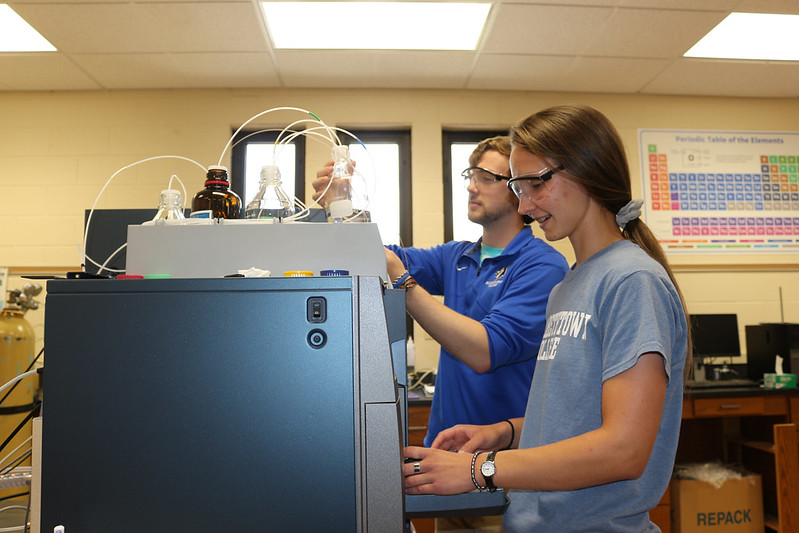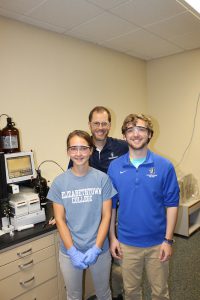Two Elizabethtown College Biochemistry and Molecular Biology students are learning to think both critically and independently while synthesizing a new PNA monomer that they hope will provide a better understanding of the function of double-stranded, noncoding RNA.
The independent student research and collaboration with an Etown faculty mentor, is part of the Summer Scholarship, Creative Arts and Research Projects (SCARP) program.
Title of Research
Nucleobase-Modified Peptide Nucleic Acids for Sequence Selective Triple-Helical Recognition of Non-Coding RNA
Student Researchers
Emily Harding ‘23 – Biochemistry and Molecular Biology
Kyle Hess ’23 – Biochemistry and Molecular Biology
Faculty Mentor
James MacKay, Professor of Chemistry
Emily: The majority of the human genome that is transcribed into RNA is not translated into proteins, but it is known that this double-stranded, noncoding RNA can have functions such as gene regulation and enzymatic functions. In order to gain a better understanding of the double-stranded, non-coding RNA, we are synthesizing a third peptide nucleic acid (PNA) strand to form a sequence-specific triple helix with the double-stranded RNA (dsRNA). I am working on synthesizing a PNA monomer that will selectively bind to the A-U base pair of dsRNA.
Kyle: The goal of this research project is to design peptide nucleic acid (PNAs), which selectively bind to double-stranded sequences of non-coding RNA to aid in their detection. This idea of detecting non-coding RNA sequences has become ever more important as it was determined that coding RNA sequences only comprise 2% of all transcribed DNA. The work performed in the laboratory includes designing and completing the reactions required for the synthesis of these molecules.
Why did you choose this topic?
Emily: I discovered my passion for organic chemistry during freshman year in Organic Chemistry I. I wanted to apply what I learned in my organic chemistry classes to the research lab and create possible therapies for diseases in the body.
Kyle: I thoroughly enjoyed my organic chemistry classes taught by Dr. MacKay, and continuing research with him was the next logical step. His research primarily focuses on organic synthesis, but also deals with the biological aspect of integrating the molecules into a human system. As a Biochemistry major, it was important to me that the research I conduct covers both of these disciplines. Because of this interdisciplinary connection, as well as my personal love for organic chemistry, this research topic covered both my personal and academic interests.
What is the most interesting aspect of this research?
Emily: The most interesting aspect of this research is finding ways to isolate the desired compounds from the byproducts and knowing that the compounds we are synthesizing have the potential to treat diseases in the body through sequence-specific recognition of dsRNA.
Kyle: The most interesting aspect of this research for me is working with molecules that I learned about during my two semesters of organic chemistry. I remember working through the synthesis questions in my class and enjoying them as challenging puzzles. This research opportunity provides me with an opportunity to build those skills further and apply them to topics that have yet to be discovered.
How has Professor MacKay helped you throughout this experience?
Emily: In Dr. MacKay’s lab, there is a nice balance of learning to think critically and independently, while receiving guidance in order to learn new skills in the lab. We aren’t simply given the answers to obstacles faced in our chemistry; we are taught how to think critically and problem solve, which will ultimately be beneficial for graduate school.
Kyle: It has been nice to have a mentor that is willing to discuss future plans so that I stay productive and learn valuable skills in professional time management. Additionally, having a mentor with a plethora of experience with organic chemistry synthesis is beneficial as it allows us to work together to find solutions to problems that occur in the laboratory. Most of the time, it is determining which reaction conditions would be best to achieve the end result, but it can also extend to determining how or why a reaction did or didn’t work and how my skills or the reaction can be improved upon for the future.
Hear from the Faculty Mentor – James MacKay


